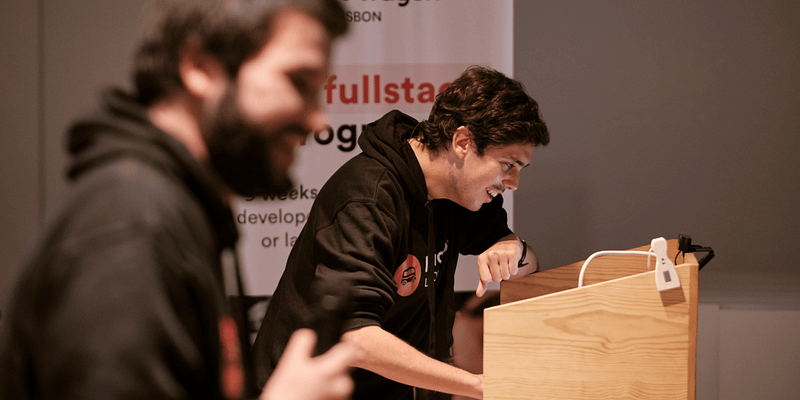
Students at Le Wagon
Coding bootcamps have been around for years now. We’ve been talking about them for a while, partnering up with great bootcamp schools and promoting them. Yet, somehow, the market still hasn’t fully opened up to them. That’s why we want to continue putting great content out there that helps debunk some common myths 🙂
Le Wagon is a global community with campuses all around the world. We interviewed its Southern Europe General Manager, Nuno Loureiro, to get an insider perspective on how things are looking for bootcamps, what their competitive advantages are and how we can contribute to their growth.
1 — Hi Nuno! Thanks for talking with us 🙂 What do you think are the advantages of a bootcamp compared to more traditional educational paths?
In my opinion, traditional education providers have been fairly immutable over the decades (and even centuries) and have not been able to adjust to the needs of the market, namely on:
Design. By default, bootcamps are built for a very specific outcome — in the case of Le Wagon, our courses are built so that individuals may learn on how to create an end-to-end Web app or Data product in a team. This is an immensely valuable skill for your current job, a career shift or even your own entrepreneurial adventures.
Practical. Complementarily, bootcamps follow a 20% theory / 80% practice approach which favours learning by doing rather than learning by listening. Therefore, students will focus on acquiring hard and soft skills to be used on their day-to-day, not being overwhelmed with low-value-added content without real-world application.
Speed. Thanks to a growing talent gap in tech, not only bootcamps enable individuals to change careers and materially increase their job market value in a couple of months, they allow them to do so with a lean mindset — graduates have not invested 3–5 years learning thus it is easy to pivot, within or outside the tech space.

Warm vibes at Le Wagon
2 — Do you think bootcamps still suffer from misconceptions and scepticism?
I don’t believe so, I personally feel that bootcamps still suffer mostly from lack of awareness, meaning that a huge portion of young talent and tech recruiters have merely a high-level view on what a bootcamp really is and its potential.
In Portugal, in particular, Le Wagon has been working closer and closer with other players in the space and strategic partners (such as Câmara Municipal de Lisboa, European Commission or Nova SBE) in order to offer literacy programs to local communities and present alternative EdTech solutions to the public.
Having said that, once individuals and organisations become aware of the tremendous pool of talent emerging from these intensive programs, there is much more a significant interest in deepening our collaboration and contribution than scepticism.
3 — How are the job prospects for a recent bootcamp graduate?
There is a huge talent gap in the Portuguese tech market: the number of candidates is less than 60% of the job openings. As such, companies are starting to understand that the market for mid-level and senior developers and data experts is not only increasingly insufficient to meet demand, but is already too competitive — on compensation but also on work conditions, for example benefits, flexible working hours and unlimited holidays.
As such, according to the very insightful tech careers report from Landing.Jobs, 1 out of every 4 tech employees is either self-taught or has come from a bootcamp (4.8%, a 50% increase from 2020), which showcases how the industry is maturing in terms of openness to junior talent who don’t necessarily have a Computer Science degree.
In terms of pay, the same report from Landing.Jobs presents a junior gross salary of 17 to 23 thousand € per year in Portugal, depending on the different roles, which we find fairly accurate for our students‘ outcomes.
As a reference for Le Wagon, based on our report on the outcomes of Southern Europe for the classes concluded during the second half of 2020, 89% of our job-seekers found jobs in 6 months and it took them on average 33 days only to do so! These values for Portugal, Spain and Italy are on par with the global figures.

Nuno Loureiro, Southern Europe General Manager at Le Wagon
4 — How do you think bootcamps are perceived by companies?
Considering the talent gap previously mentioned, I believe we are close to the tipping point of the massification of bootcamps as a key source of junior talent for many areas, not only related with dev and data skills but also increasingly for other complementary areas (eg. sales, growth hacking, product management).
At Le Wagon we already work with innovative Hiring Partners of all industries and sizes, from leading worldwide corporations like PwC, Deloitte, BNP Paribas or Mastercard to startups and softwarehouses (for example, Gaspard+Bruno, an amazing creative agency which hires their junior devs almost solely with us).
Above all, companies are starting to realise that they are not hiring a career shifter with 9 weeks of training, they are hiring a driven individual, committed to this new career and that (quite often) has previous work experience and business knowledge which are incredibly valued for the company in conjunction with the newly acquired skills.
5 — In order for tech professionals to get seniority, they first need to be hired as juniors and gain experience. So how do you think we — bootcamps and companies — can work together to make that happen?
I believe that the first step for the lagging companies is testing: hiring bootcampers and analysing how they perform! This includes crafting a junior recruitment process which is not biased for advanced hard skills on a specific tech stack and hiring enough bootcampers to be able to drive solid fact-based conclusions.
The second step is actually at a higher level, in policymaking. Unlike countries such as France or Germany, there is an excessive protectionism of traditional education and a lack of support to the EdTech providers already fuelling our unicorns and growth — in the form of public incentives, company-led training regulation, private-public training programs or even professional certification and recognition.
Finally, as a community, we have to bring back people to the centre of the digital transformation agenda. For example, looking at the last Web Summit schedule, we can find dozens of groundbreaking talks about upcoming technologies but not even a handful of sessions on those that will materialise them — all of us humans!

Le Wagon in Lisbon
6 — Are there countries/areas where bootcamps are more valued? And, if so, which ones and why do you think that is?
In terms of geographical reach, bootcamps are typically valued in countries where there is a local startup able to acquire a global scale (eg. Le Wagon in France) and are frequently featured in the media, raising the general know-how about the courses.
Most importantly, bootcamps are very valued in ecosystems with a dynamic innovation and entrepreneurial scene, since they become a predominant source of talent for earlier stage companies who are able to attract career shifters looking for professional accomplishment and willing to take risks, unlike many college graduates.
All in all, our mission at Le Wagon is to change people’s lives by providing the skills needed for them to find their dream job in the digital world. We’re really proud of the 130+ amazing individuals we’ve helped last here on our Lisbon campus and excited to change even more lives next year, with the support of great partners like Landing.Jobs.
Awesome! Thank you so much Nuno! 🙂
Other suggested reads: Coding bootcamps don’t work until they do | Is attending a bootcamp a smart move for my tech career? |






0 Comments